|
|
|
Sort Order |
|
|
|
Items / Page
|
|
|
|
|
|
|
| Srl | Item |
| 1 |
ID:
146123
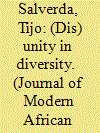

|
|
|
|
|
| Summary/Abstract |
White Africans are particularly associated with the troubles South Africa and Zimbabwe have faced throughout their histories. The story of the Franco-Mauritians, the white elite of Mauritius, and how they have fared during more than forty years since the Indian Ocean island gained independence, is much less known. However, their case is relevant as a distinctive example when attempting to understand white Africans in postcolonial settings. Unlike whites elsewhere on the continent, Franco-Mauritians did not apply brute force in order to defend their position in the face of independence. Yet the society that emerged from the struggle over independence is one shaped by dominant beliefs about ethnicity. As this article shows, despite a number of inverse effects Franco-Mauritians have benefited from this unexpected twist, and part of the explanation for their ability to maintain their elite position lies therefore in the complex reality of ethnic diversity in postcolonial Mauritius.
|
|
|
|
|
|
|
|
|
|
|
|
|
|
|
|
| 2 |
ID:
063702
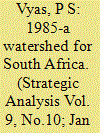

|
|
|
| 3 |
ID:
091282
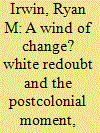

|
|
|
|
|
| Publication |
2009.
|
| Summary/Abstract |
In July 1963, U.S. Secretary of State Dean Rusk held a private meeting with Dr. Willem Naude, the ambassador from South Africa. "A rough time [is] ahead," Rusk explained as the representative sat down in his office. "We are under enormous pressure but do not intend to give in." Several members of the so-called African bloc at the United Nations had successfully protested the practice of apartheid-South Africa's system of institutionalized racial discrimination-in the Security Council that year, and pressure was rapidly mounting in the General Assembly for mandatory economic sanctions against South Africa. The ambassador looked across Rusk's desk and noted that it was "ironical" that ten years earlier they had been allies in the Cold War, and now his country was being isolated in its struggle against a "common enemy." He went on to assert, "The United States [is] to a large degree responsible for releasing these revolutionary forces in the world. The goal of a great power should be to play down tensions and try to get people to talk together, but the United States without even opening its mouth [has] released dangerous forces in the world." Rusk paused for a moment before responding, "[I wonder] if these forces [are] not deeply rooted in the nature of man. [I wonder] if this discourse has not been going on for 2,000 years. Did not man, like most animals, not like to be pushed around too much?"
|
|
|
|
|
|
|
|
|
|
|
|
|
|
|
|
| 4 |
ID:
190923
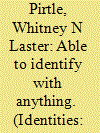

|
|
|
|
|
| Summary/Abstract |
The Apartheid South African state crafted Coloured racial identities through a powerful racial project that signified and positioned them as a group that was both neither and between White and Black. Non-Racialism in post-Apartheid South Africa has, however, loosened the role of the state in making race. So how has the transition of the state impacted ‘Coloured’ racial identities today? Informed by both macro-level theories of racial formation and micro-level theories of racial identities, I examine racial identity choices as constrained by the state among 50 adults. I find identities choices are influenced by transformations in the racial state: racialisation via reappropriating ‘Coloured’; re-formation and joining of ‘Black’; racial uplift construction as ‘Khoisan’; and a non-racialist approach to identity as ‘Human’. I argue transformations of the racial state shape, or even lead to, a transition in racial identities and therefore clarify theorises of co-constructed racial identity formations.
|
|
|
|
|
|
|
|
|
|
|
|
|
|
|
|
| 5 |
ID:
108220


|
|
|
| 6 |
ID:
151008
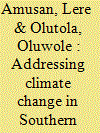

|
|
|
|
|
| Summary/Abstract |
Climate change is a global challenge. Its ramifying effects on both natural and human systems cut across different regions of the world. While Africa as a whole is being confirmed to be more affected by climate change due in part to a relatively low(er) mitigation and adaptive capacity, coupled with a situation where majority of its population depends mainly on natural resources, Southern Africa is singled out as a potentially vulnerable subregion for other additional factors. Representing a milestone in the trajectory of the global climate change process, the 21st session of the Conference of Parties (COP-21) resolved with a consensual climate change deal known as the Paris Agreement. The Agreement, through the instrumentality of a ratchet up mechanism, otherwise described as Intended Nationally Determined Contributions (INDCs), seeks significant cuts in greenhouse gas (GHG) emissions effectively from 2020. In essence, it calls for a novel though gradual shift from carbon-emission approach to low emission development strategy. This, no doubt, is indispensable to sustainable development at all levels. Beyond national commitments as obligatory for parties, there is a need for regional cooperative efforts which should bring about shared appropriate policy responses that promote green energy as well as seize opportunities inherent in it for national and deterritorialised gains. Adopting neoliberal and green theories, the institutional framework of the Southern Africa Development Community (SADC) where South Africa is expected to take a lead is examined in this article.
|
|
|
|
|
|
|
|
|
|
|
|
|
|
|
|
| 7 |
ID:
142515
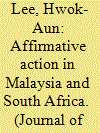

|
|
|
|
|
| Summary/Abstract |
This paper examines affirmative action in Malaysia and South Africa, two regimes that favor majorities. Malaysia’s highly centralized and discretionary programme is in contrasts with South Africa’s more democratized, decentralized and statutory structure. With regard to affirmative action outcomes, both countries have made quantitative gains in increasing representation of Bumiputeras in Malaysia and blacks in South Africa, in tertiary education and high-level occupations. However, there is also evidence to suggest continuing, primarily qualitative, shortfalls, in terms of graduate capability, dependence on public sector employment, and persistent difficulty in cultivating private enterprise. The results reported here emphasize the importance of implementing affirmative action effectively in education, while exercising restraint in employment and enterprise development.
|
|
|
|
|
|
|
|
|
|
|
|
|
|
|
|
| 8 |
ID:
148242
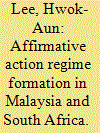

|
|
|
|
|
| Summary/Abstract |
This paper examines the formation of majority-favouring affirmative action (AA) regimes in Malaysia and South Africa. Malaysia’s Constitution premises AA on a group’s special position; South Africa’s refers to unfair discrimination. Malaysia established AA amid continuation of a political order and consolidation of executive power, while South Africa democratized and transitioned from minority to majority rule. Minority groups held less economic power in Malaysia than in South Africa. Consequently, AA in Malaysia is characterized by discretionary decision-making, and quota-based, centralized programmes, whereas South Africa has followed a legislative route involving negotiation and enforcement of target-based, statutory requirements, under less centralized oversight.
|
|
|
|
|
|
|
|
|
|
|
|
|
|
|
|
| 9 |
ID:
015989
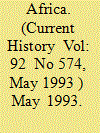

|
|
|
| 10 |
ID:
017157


|
|
|
| 11 |
ID:
039411
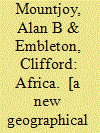

|
|
|
|
|
| Publication |
New York, Frederick A Praeger Publishers, 1967.
|
| Description |
688p.Pbk
|
|
|
|
|
|
|
|
|
|
|
|
Copies: C:1/I:0,R:0,Q:0
Circulation
| Accession# | Call# | Current Location | Status | Policy | Location |
| 008195 | 916.096/MOU 008195 | Main | On Shelf | General | |
|
|
|
|
| 12 |
ID:
045349
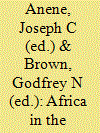

|
|
|
|
|
| Publication |
London, Ibadan University Press and Nelson, 1968.
|
| Description |
xvi, 555p.: plates, maps, figureshbk
|
|
|
|
|
|
|
|
|
|
|
|
Copies: C:1/I:0,R:0,Q:0
Circulation
| Accession# | Call# | Current Location | Status | Policy | Location |
| 003479 | 960.3/ANE 003479 | Main | On Shelf | General | |
|
|
|
|
| 13 |
ID:
128806
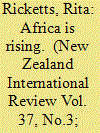

|
|
|
| 14 |
|
| 15 |
ID:
075102


|
|
|
|
|
| Publication |
Leiden, Brill, 2005.
|
| Description |
xvi, 495p.pbk
|
| Standard Number |
9004144625
|
|
|
|
|
|
|
|
|
|
|
|
Copies: C:1/I:0,R:0,Q:0
Circulation
| Accession# | Call# | Current Location | Status | Policy | Location |
| 051935 | 960.305/MEH 051935 | Main | On Shelf | General | |
|
|
|
|
| 16 |
ID:
095465
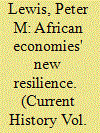

|
|
|
|
|
| Publication |
2010.
|
| Summary/Abstract |
Near-term prospects for the region's economies are encouraging when one considers the enormous shocks of the recent crisis and the depth of the global downturn.
|
|
|
|
|
|
|
|
|
|
|
|
|
|
|
|
| 17 |
ID:
191041
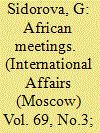

|
|
|
|
|
| Summary/Abstract |
THE myth of the indestructibile primacy of Western countries - former metropolises in world affairs, including on the African continent - is crumbling day by day, proving its groundlessness. The colossus's feet turned out to be clay, unable to stand the test of time. Today, the West is at a loss over Russia's practical steps to strengthen friendly relations with the states of Africa and the East in the name of international security and cooperation for the benefit of all peoples.1.
|
|
|
|
|
|
|
|
|
|
|
|
|
|
|
|
| 18 |
ID:
114740
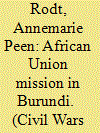

|
|
|
|
|
| Publication |
2012.
|
| Summary/Abstract |
In 2002, the African Union (AU) was established to promote peace, security and stability on the continent. Since then, it has launched military operations to help regulate conflicts in Burundi, Comoros, Sudan and Somalia. This contribution evaluates the African Mission in Burundi (AMIB). It explores the AU's nascent approach to peacekeeping and investigates the relationship between its aspiration, experience and prospect of providing 'African solutions to African problems' in the security realm. The AMIB case study suggests that both the intervener's capabilities and the conflict context in which it operates affect its success. How these two categories relate to each other also matters. Different actors affect both internal and external contextual conditions. More support from one actor can compensate for less support from another. During AMIB, South African commitments made up for limited resources on part of the AU, its member states and institutions as well as insufficient interest from international donors.
|
|
|
|
|
|
|
|
|
|
|
|
|
|
|
|
| 19 |
ID:
106631
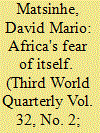

|
|
|
|
|
| Publication |
2011.
|
| Summary/Abstract |
Since the collapse of apartheid, the figure of Makwerekwere has been constructed and deployed in South Africa to render Africans from outside the borders orderable as the nation's bogeyman. Waves of violence against Makwerekwere have characterised South Africa since then, the largest of which broke out in May 2008 in the Johannesburg shantytown of Alexander. It quickly spread throughout the country. The militants were black citizens who exclusively targeted African foreign nationals, with some witnesses reporting grotesque scenes of sadistic behaviour. So far these violent spurts have been described as xenophobia, overlooking the history of colonial group relations in South Africa. From the perspective of this article, the history of colonial group relations cannot be overlooked, for the relations between citizens and non-citizens are extended shadows of this history. I argue that, rather than rushing to characterise these relations as xenophobia, we should factor in the history of colonial group relations and the extent to which the post-apartheid ideology of Makwerekwere and South Africa's 'we-image' vis-à-vis the rest of Africa may bear the imprints of this history.
|
|
|
|
|
|
|
|
|
|
|
|
|
|
|
|
| 20 |
ID:
119719
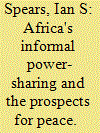

|
|
|
|
|
| Publication |
2013.
|
| Summary/Abstract |
Power-sharing and inclusion continue to inform contemporary approaches to conflict resolution and post-conflict governance in Africa. But aside from power-sharing efforts in relatively well-institutionalized countries such as South Africa and Rhodesia/Zimbabwe, most efforts at formal inclusion have been short-lived. Indeed, many high-profile experiences in power-sharing governments have been failures. African governments and opposition groups do engage in inclusion, but, owing to the non-institutionalized nature of African politics, it is almost always directed toward more limited short-term objectives such as regime survival or material reward that comes with participation in peace processes. Surveying Africa's experience with power-sharing, this article argues that inclusion continues to be a fragile basis on which to build peace.
|
|
|
|
|
|
|
|
|
|
|
|
|
|
|
|
|
|
|
|
|